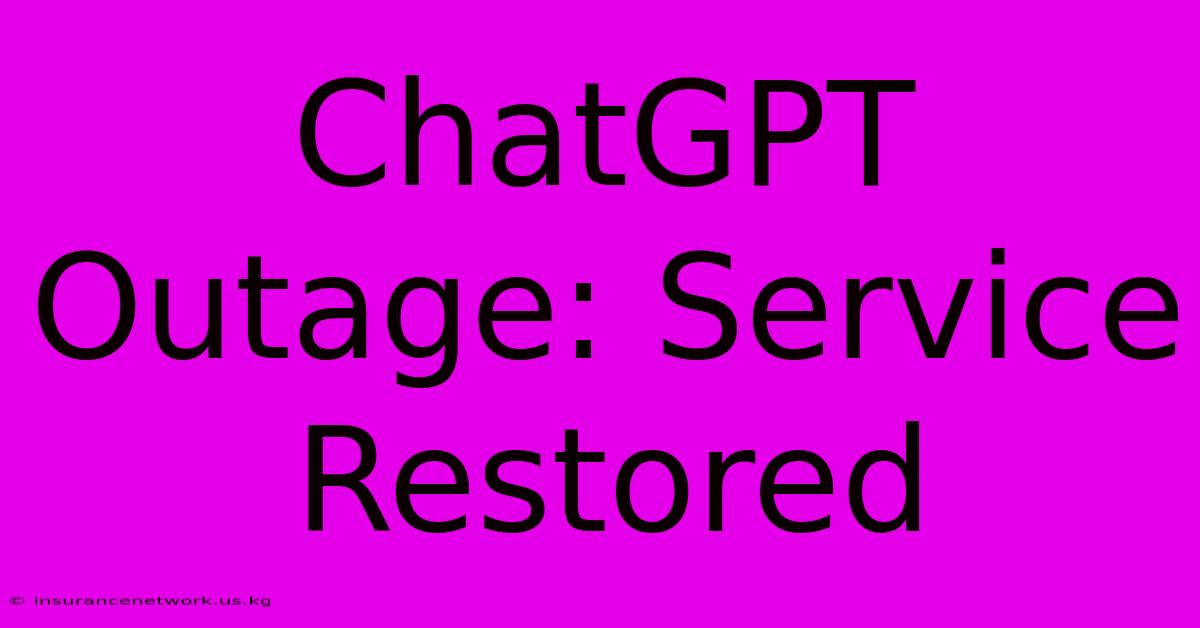ChatGPT Outage: Service Restored

Discover more detailed and exciting information on our website. Click the link below to start your adventure: Visit Best Website insurancenetwork.us.kg. Don't miss out!
Table of Contents
ChatGPT Outage: Service Restored
ChatGPT users rejoice! After a period of downtime that left many frustrated and unable to access the popular AI chatbot, service has been fully restored. This article will cover what happened during the outage, potential causes, and what users can expect going forward.
Understanding the ChatGPT Outage
The recent ChatGPT outage caused significant disruption for millions of users worldwide. Many experienced error messages, inability to log in, or simply a blank screen when attempting to access the platform. The exact duration of the outage varied depending on location and specific circumstances, but for many, it lasted several hours, impacting productivity and access to this valuable AI tool. This highlights the increasing reliance on AI services and the potential impact of even brief disruptions.
Potential Causes of the Outage
While OpenAI, the creators of ChatGPT, haven't released an official statement detailing the precise cause of the outage, several possibilities exist. These include:
-
Increased Server Load: The immensely popular nature of ChatGPT means its servers constantly handle a massive number of requests. A sudden surge in usage or a cascading failure could easily overwhelm the system, leading to widespread downtime.
-
Software Glitch or Bug: As with any complex software system, unforeseen bugs and glitches can arise. A single critical error could cascade and trigger a system-wide failure, affecting availability.
-
Network Issues: Problems within OpenAI's network infrastructure, such as connectivity issues or routing problems, could also have contributed to the outage. These issues can be difficult to diagnose and resolve quickly.
-
Maintenance: Although unlikely to cause such a widespread and prolonged outage, planned or unplanned maintenance could have been a contributing factor.
What to Expect After a ChatGPT Outage
After a service restoration following a major outage like this, users can expect:
-
Improved Stability: OpenAI likely implemented measures to enhance the system's stability and resilience to prevent future outages. This could involve upgrades to infrastructure, improved load balancing, and enhanced monitoring systems.
-
Potential Feature Updates: While not directly related to the outage, such events sometimes trigger updates to the underlying architecture, potentially introducing new features or improvements in the future.
-
Increased Monitoring: Expect increased vigilance on OpenAI's part regarding server health and user activity. This proactive monitoring will aid in early detection and prevention of future service disruptions.
Learning from the ChatGPT Outage
This outage serves as a reminder of the importance of reliable infrastructure and robust error handling in AI-powered services. While OpenAI has a strong track record, no system is immune to unforeseen circumstances. This event highlights the need for redundancy and fail-safe mechanisms to ensure minimal disruption to users in the event of future issues.
Key takeaways: The recent ChatGPT outage underscored the reliance on AI tools and the potential disruption caused by downtime. While the exact cause remains unconfirmed, potential factors included server overload, software glitches, or network issues. OpenAI's swift restoration of service indicates their commitment to providing a reliable platform, and future improvements are expected to further enhance stability. The incident also highlights the importance of robust infrastructure in the ever-growing world of AI.

Thank you for visiting our website wich cover about ChatGPT Outage: Service Restored. We hope the information provided has been useful to you. Feel free to contact us if you have any questions or need further assistance. See you next time and dont miss to bookmark.
Featured Posts
-
Wolves Defeat Man Utd 2 0 Stats
Dec 27, 2024
-
Teddy Bridgewater Back With Lions
Dec 27, 2024
-
K State Football Beats Rutgers
Dec 27, 2024
-
Chelsea Vs Fulham Match Result And Score
Dec 27, 2024
-
Kansas State Vs Rutgers 2024 Rate Bowl Line
Dec 27, 2024
